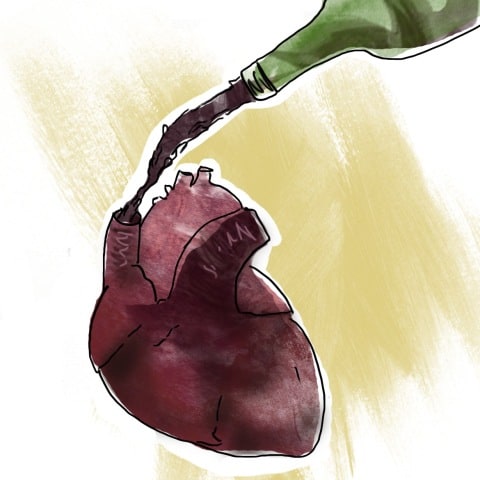CASEY BALON
 How do we judge what is truly good for us?
How do we judge what is truly good for us?
The long-standing belief that moderate alcohol consumption has health benefits is slowly being debunked — and once again our perceptions of what is “good” for us is shifting.
While the risks associated with drinking are inarguable, most of its advantages can’t be pinpointed on paper. We all know that drinking excessive amounts of alcohol is detrimental to almost every aspect of one’s health, but a commonly touted fact is that light to moderate drinking possesses positive properties for the heart. In other words, a glass of red wine a day could help keep the cardiologist away. But with this train of thought in the forefront of our minds, maybe we haven’t been looking at the whole picture.
Several studies in the past — like the Journal of the National Cancer Institute’s in 2009 — have claimed that the health risks of drinking most definitely outweigh the benefits. It is becoming clear that the whole “alcohol is good for the heart” message may be based on unstable grounds. Earlier this year, the World Health Organization put out a warning claiming no amount of alcohol is safe, particularly when looking at its effect on cancer risk.
Furthermore, many within the health field question the cause and effect relationship between moderate alcohol intake and the reduction in cardiovascular events. Does alcohol itself protect against coronary heart disease, or does the lower risk stem from factors such as the concurrent reduction in stress? It is difficult to tell.
On paper, it looks like the benefits of drinking might be modest at best, but we can’t completely scrap the idea that a little alcohol can be good for a person. There is still evidence trickling in surrounding the positive role it can play in other conditions, such as dementia — but, again, is it the alcohol or compounding factors contributing to this?
What about the role that our genetics play? At this point in time, we don’t know each and every gene we possess. We don’t definitively know which of our actions are pulling the trigger for our individually loaded genetic gun. Many of us don’t even know if we are an average healthy adult or actually someone who has an increased risk for certain conditions.
At the end of the day, running with the idea that a sole component of our diet or lifestyle — like alcohol — will contribute to everlasting health is just plain silly.
It’s time we start viewing things for what they are, whether it’s that beer you’re about to drink or that burger you’re about to eat — there are both advantages and consequences to what you decide to do with your body. Only you can determine if it’s worth it.
That being said, there’s also an inherent risk to jumping out of a plane with a parachute strapped to one’s back, but if I decide the increased quality of life that it brings to my day is worth the risk, then I’m going to do it.
If you decide the joy, relaxation or increased quality of life an action brings to you is right, then there’s a place for it. If it allows you to relax, be happy and enjoy the moment, then it’s up to you to decide if it’s worth it. If you believe the benefits outweigh the potential consequence, then why not let loose once in a while?
—
Graphic: Stephanie Mah/Graphics Editor
Leave a Reply